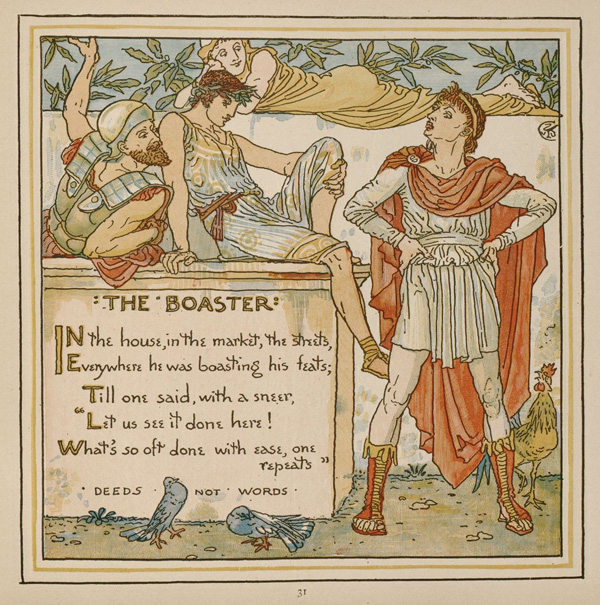1. νῦν: now
2. μητὲ...μητὲ: neither...nor
3. ἰδού: behold! see!
4. πρίν: before; until
5. πάλιν: back, again
Πρίν κεν λύκος οἶν ὑμεναιοῖ.
Here are the proverbs and sayings:
Νῦν θεοὶ μάκαρες.
Μητὲ μέλι, μητὲ μελίσσας.
Ἰδοὺ Ῥόδος, ἰδοὺ καὶ πήδημα.
Ἀνὴρ ὁ φεύγων καὶ πάλιν μαχήσεται.
Plus some commentary:
Here is an illustration for the Aesop's fable by Walter Crane:
Νῦν θεοὶ μάκαρες.
Now the gods (are) happy.
This saying is used when the wicked are rightfully punished, the idea being that the gods are pleased with the just outcome. There is also a saying that expresses the opposite idea: Θεοῦ δ᾿ ὄνειδος τοὺς κακοὺς εὐδαιμονεῖν, "It is a reproach to God when bad people prosper."
Μητὲ μέλι, μητὲ μελίσσας.
Neither the honey, nor the bees.
From the Greek μέλισσα we get the name Melissa. The words are adapted from the poet Sappho: Μήτ᾿ ἐμοὶ μέλι, μήτε μέλιττα, "for me neither the honey, nor the bee." For Sappho, no doubt, the sweetness and sting referred to the sweetness and sting of love. You can read about her at Wikipedia: Sappho.
Πρίν κεν λύκος οἶν ὑμεναιοῖ.
When the wolf marries the sheep.
Compare the English saying "when hell freezes over," i.e. never. The impossible hypothetical is expressed with the optative: ὑμεναιοῖ. In other words, the wolf is never going to want to marry the sheep; he is always going to prefer to devour her. The words are from Aristophanes's play, Peace.
Ἰδοὺ Ῥόδος, ἰδοὺ καὶ πήδημα.
Behold: Rhodes! Behold also: the jump!
The word ἰδοὺ is literally the imperative of ὁράω ~ εἶδον, and it is used as an interjection. These words are the punchline of an Aesop's fable about a boasting traveler. The man claimed that when he had been at Rhodes, he had won a long-jump competition. Of course, travelers' tales are not to be believed, so someone in the audience used these words to challenge the traveler to show them, here and now, just how far he can jump.
Ἀνὴρ ὁ φεύγων καὶ πάλιν μαχήσεται.
The man who flees will fight once again.
Compare the English rhyming proverb: "He who fights and runs away / lives to fight another day." From Greek πάλιν we get English palindrome.
Here is an illustration for the Aesop's fable by Walter Crane:

No comments:
Post a Comment